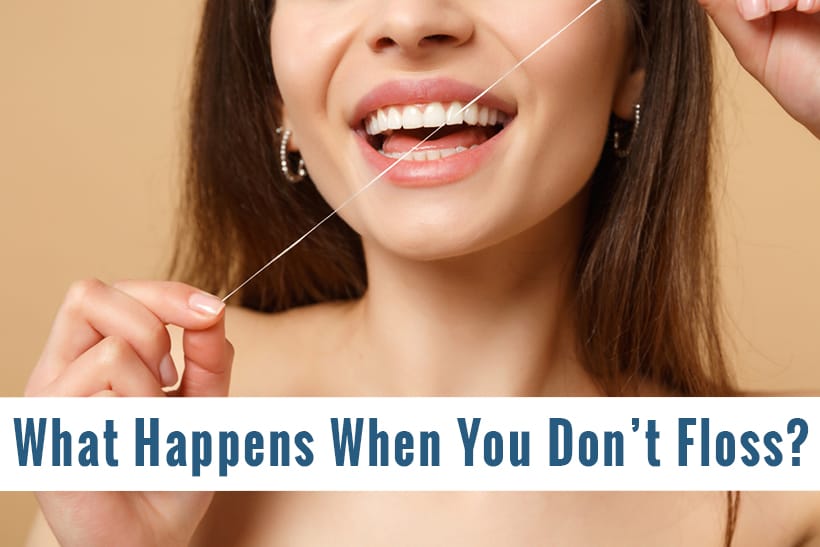
So you are on your way to your six-month routine dental care appointment, and suddenly you realize you haven’t flossed since your last cleaning! Oops. Have you ever found yourself in this scenario? First of all, don’t think that you are alone. Studies show that most adults don’t floss their teeth regularly. Second, know that you can break this habit by picking up the floss today.
You’ve probably heard your dentist or dental hygienist strongly recommend daily flossing. Here at Riverside Dental, we also recommend daily flossing to all our patients. Flossing is one thing that many see as another annoying step that will only add even more length to their bedtime routine. If you find yourself also thinking the same way about flossing, it can help to understand flossing’s actual benefits. When you floss, your smile and your dental and overall health will thank you!
So What Actually Happens When I Skip Flossing?
The actual purpose of flossing is to remove and break up the bacteria and food debris that lives in between our teeth. When we skip flossing, we leave all these bacteria and food debris behind in the dark, moist areas between our teeth. Bacteria thrive in these types of environments, so bacteria will likely grow and increase in population. Bacteria can also become a more aggressive type of bacteria when left alone.
What Harm Can This Bacteria Cause?
There are many things that this bacteria can do to our dental and overall health, thus skipping flossing may lead or contribute to:
1. Gum Recession – Often, the beginning sign of gum disease is gum recession. In gum recession, the gum tissue pulls away from the tooth, and the root surface of the tooth is often exposed and often sensitive.
2. Bad Breath – Bacteria is known for causing halitosis (bad breath) in our mouth. The most common contributors to bad breath are the bacteria that live in our tongues and between our teeth.
3. Staining Between Teeth – Bacteria, as well as food and drinks, can cause staining on our teeth. Flossing the teeth can help to keep interproximal staining at bay.
4. Tooth Decay – Bacteria in our mouth produce an acidic byproduct that can wreak havoc on our teeth in the form of cavities. Flossing can help to remove this bacteria and keep the areas between our teeth healthy and strong.
5. Gum Disease – Gum disease is not reversible. Once someone has gum disease, it is something that needs to be managed and monitored closely. Gum disease commonly starts in the areas between the teeth. One of the best things for the prevention of gum disease is flossing.
I’m Curious, Can My Dentist Tell If I Floss Or Not?
This answer is sometimes! Just like some people are more resistant to gaining weight than others, some are also more resistant to decay, gum disease, and staining than others. While some people can get away without flossing and their dentist congratulates them that everything is healthy, it may not always be this way. Bacteria can build over time, and our bodies also change with age.
I Haven’t Flossed For Years, Should I Start Now?
Yes, you should start now! While past damage can’t always be reversed, it’s still not too late to start flossing. As we have seen from above, there are many benefits to flossing. As long as you have teeth, it will be beneficial to be cleaning the bacteria around and in between them!
Hopefully, the consequences of not flossing will help you to think twice about skipping flossing next time! Getting into the habit of flossing is a great way to boost your dental and overall health while just taking a minute or two of time out of your day. Pick up your floss and floss your teeth today!



Leave a Reply